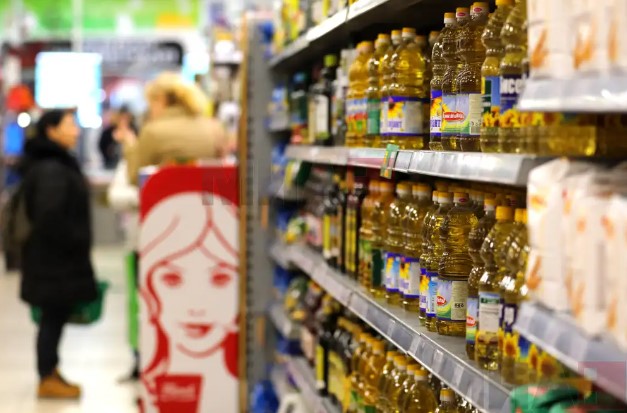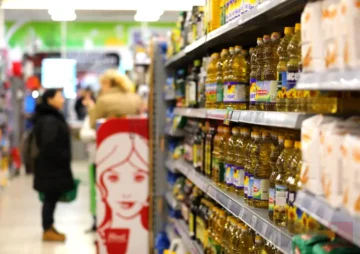The Ministry of Economy has proposed a ban on promotional sales by all retail chains in the country until November 30, while next week it will propose that the Government caps the prices of products from the food industry. This, according to Economy Minister Kreshnik Bekteshi, will lead to a linear reduction of the prices of food products by at least 10 percent, while it is possible that the decision the Government will adopt on Tuesday will include an even greater reduction of prices.
The traders, said Bekteshi, won’t know the date on which the prices will be capped, and as a result, according to the Minister, they will be unable to up the prices of products before they are capped. The capped prices will enter into force after they are published in the Official Gazette.
“All analyses are showing that there is no basis for the prices of basic food products to be increased neither by the traders nor the producers, considering the drop in prices on the global markets,” said Bekteshi.
The Minister stressed that although inflation has dropped, according to the Ministry’s findings, there is still room for price reductions and added that all retail chains have recorded an increase in income compared to last year.
“Maybe the decision to ban promotional sales may seem strange since we are making a certain reduction of prices impossible to the citizens, but this isn’t the case, because next week the decision to cap prices in the food industry will follow as well. We are making this decision because we noted that certain supermarket chains are abusing the option to carry out promotional sales or certain campaigns. Therefore, in order for things to be clear for the citizens and consumers, they [the markets] will not have this option until November 30, and as a result, the exact price of a certain product will be known, instead of making changes to the prices daily or weekly in order to confuse the consumers and citizens,” said Bekteshi.
Bekteshi said that on Thursday the Ministry of Economy will deliver an interpretation of the Law on Consumers to the head of the State Market Inspectorate, which, apart from fines, will also lead to closures for supermarkets and traders in food products that fail to comply with the measures.
Since the end of 2019, said Bekteshi, market prices have increased by 23.3 percent globally, while in North Macedonia they’ve increased by 47 percent.
“I am convinced that such decisions will additionally reduce prices, especially for products that have received huge price hikes. There will be no more gentlemen’s agreements, instead, there will be concrete and concise decisions that must be respected by all traders and producers of basic food products. There will be no more negotiations, and these will be the final decisions. Apart from fines, I am sure that certain entities will be closed if they fail to comply with the measures,” said Bekteshi.
Bekteshi announced that on Thursday he will hold a meeting with representatives of seven or eight retail chains, during which he will convey the positions of the Ministry of Economy regarding the measures that will follow in terms of setting the prices of food products.
In times of crisis, companies should not be deepening the crisis even more through unethical behavior, Deputy Prime Minister for Economic Affairs Fatmir Bytyqi said in response to reporters’ questions on alleged price fixing in the food industry.
Speaking to the press ahead of the Regional Social Entrepreneurship Forum organized by the Regional Youth Cooperation Office, Bytyqi said attempts were being made to prove these allegations.
He added that unethical behavior was one of the very reasons that 52 percent of young people were fleeing the Western Balkans.
“Unethical behavior makes us unable to keep young people here. At today’s event, we are talking about opportunities for young people, but on the other hand, we are seeing all kinds of unethical behavior. This raises the question how to convince them to stay,” he said.
“We have tried all the pricing options for products. I come from the business sector, which works for profit, but besides profit there is also ethics and morality,” Bytyqi said.
“That’s why I went to the Commission for the Protection of Competition yesterday and talked with them about launching a probe in several sectors and seeing if we can potentially prove there is collusion regarding prices,” he added.
Bytyqi said price increases on world stock markets due to inflation were considerably lower than those in the country.
“Something is going on. Our country cannot be a unique case, an isolated island when it is an integral part of Europe. According to FAO data, stock exchange prices in the European Union are lower by a quarter than they are here. If EU stock exchange food prices increased by 11 percent, here they have increased by 46 percent. This is not ethical,” he said.
He said price inspectors had to monitor companies more frequently, especially in the food industry.
“By strengthening the capacities of the Commission for the Protection of Competition and all other inspection services, we will try to put things in order and keep young people in the country.
“Our struggle to keep young people is not the struggle of only one individual or one government, but of all stakeholders in society. Everyone needs to understand this, regardless of whether they are businesspeople, politicians, members of academia or ordinary citizens.
“We need to love our country the way we love ourselves,” Bytyqi said.







Comments are closed for this post.